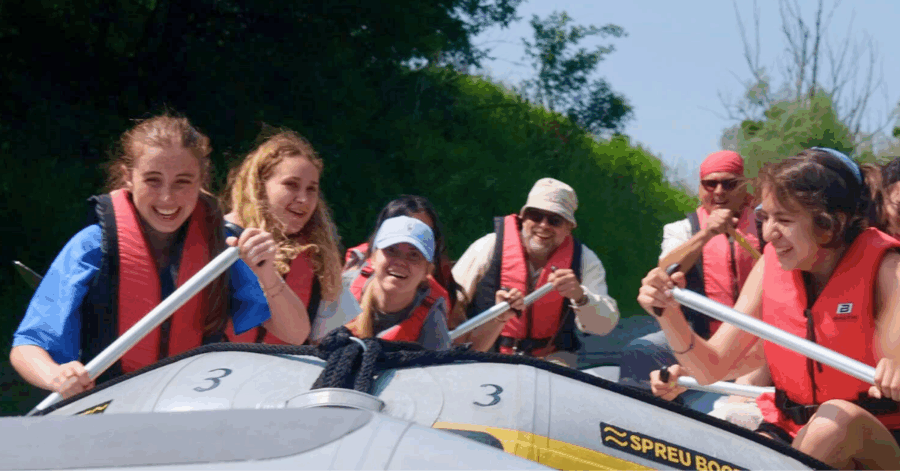In Australia, at the end of September, all the university students are given a mid-semester break. I figured this was the perfect opportunity to do some traveling and exploration, and I decided to take a two-week backpacking trip up the Australian east coast.
This trip would take me and a few friends up through Byron Bay, Gold Coast and Brisbane, from which point I would travel on my own up to Cairns and Townsville in Northern Queensland. The whole journey lasted 16 days and included 5 cities, 4 solo hostel stays, 52 hours of Greyhound bus rides and a 2.5-hour plane ride back home.

When I first set off, I was staying in a different hostel from the rest of my friends. This was fine during the day when I was out and about with company, but when I got back to my hostel for the evening, I felt alone. At the end of a lot of those days, I ended up in my bunk bed, bingeing Netflix. It wasn’t my idea of a solo girl boss taking on a big city, making friends with everyone I met and doing crazy, spontaneous things. At least, not yet.
Initially, traveling alone in new cities with new people was very intimidating. Hostels are meant to be great places to socialize with other travelers and make friends. But talking to new people, especially those who seemed to already have their own friend groups, was anxiety-inducing. However, I started this trip with one goal in mind: to be comfortable with being uncomfortable. I didn’t want to be perfect at solo travel; I just wanted to get better at it.
I was determined not to let my anxieties stop me from achieving my goals. Here are my tips for helping other solo travelers step out of their comfort zone:

1. Set small, achievable goals for yourself.
One of the goals I set for myself on this trip was to talk to someone I didn’t know while cooking dinner one evening. This was a small enough goal that it felt achievable, while still challenging me to do something out of my comfort zone. This advice can be applied to all aspects of your study abroad: For example, you could set a goal to try three new types of foods from your host country’s culture or dedicate an hour a week to practicing your language skills with someone. Setting small, personal and achievable goals throughout your experience abroad can help you to attain personal, cultural and educational growth.
2. Don’t think. Just do.
Anxiety is one problem many people face when attempting something new and challenging. Anxiety can manifest in sweaty palms before a big speech, a racing heart before getting on a flight or bailing before attempting a new wakeboarding trick. When you think too much about something that makes you nervous, you often don’t end up doing it. Sometimes, it’s better to just “send it.” Instead of thinking about every aspect of how you want a conversation with a new person to go, just go say hi and see where it takes you!

3. It’s OK to lean on your support network.
There are times when you just need to hear from your loved ones. Whether that means Face-timing your grandma in the morning for a quick hello or calling your bestie for 3 hours to give full life updates, a piece of home can be just the inspiration you need. When I was frustrated about socializing in my hostel, my friend encouraged me to open up more. In the end, she was just what I needed to come out of my shell and be more social. Utilizing your support networks should be encouraged, as it can help you feel more at ease and ready to embrace your newfound challenges.
4. Reflect on your experiences.
It’s important to remind yourself why you’re doing what you’re doing. Reflection can help us monitor if we’re moving toward our goals. After a new experience, try to reflect and ask yourself why you did it and why it was important to you, as well as how you can learn from it. Thinking about our experiences makes us more intentional about our actions going forward.
5. Be open-minded and embrace new challenges.
Be spontaneous! Take challenges as they come at you! Unexpected challenges are one of the best parts of studying abroad, and they come up quite often. One of the perks of exploring is you never know what’s going to happen. With that in mind, it’s important to be able to roll with the punches — this will make your experience much more fulfilling.

Studying abroad offers many opportunities for personal, professional and educational growth, but it is up to you to put yourself in those positions of growth. If you don’t step out of your comfort zone and push yourself to take on new and challenging things, you will never grow as a person. You will face many challenges during your study abroad program, and it is up to you to accept those challenges. Stepping out of your comfort zone is the best way to prepare yourself for future life situations and to achieve your goals.
Until next time,
Peyton
This post was contributed by Peyton Sorensen, a Global Ambassador for Fall 2022. Peyton is a senior chemistry major, with a focus in materials and a Bridging Disciplines certificate in environment and sustainability, studying abroad in Sydney, Australia.






Hi, Peyton, thank you for sharing this! Such important insights! I love the tip about setting small achievable challenges for yourself to meet! Starting that momentum is so important. It looks like you’re having a beautiful time in Australia!